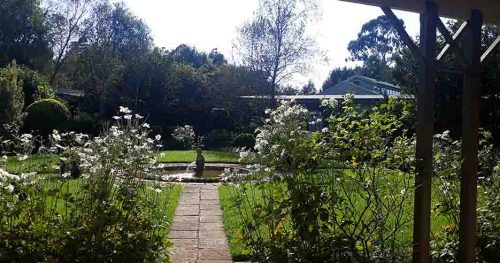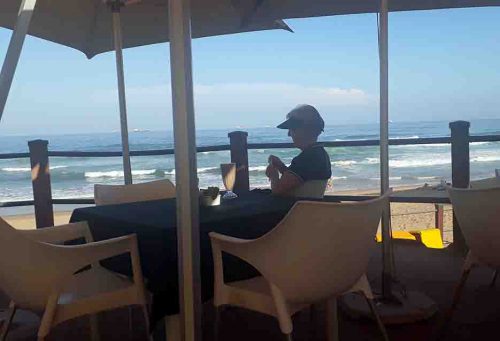
The coronavirus has left the tourism and the hospitality industry reeling as hotels, B&Bs, lodges and restaurants have closed their doors and sent staff home.
I watched the industry change in March when I spent time at Brookdale Health Hydro in Nottingham Road, KwaZulu-Natal Midlands. The first covid19 case had been reported in nearby Hilton, but as we leapt in and out of the pool, and chatted over meals, little did we know how much the dreaded virus would change our world.
It is difficult to imagine Brookdale, a cheerful, positive place in lockdown – the pool covered, the sauna still, and the sunroom in darkness. Run by the Somers-Cox family for 30 years, the hydro has about 20 rooms and suites, ranging from R5000 to R7000ppn including three meals and treatments.

While there I chatted to Khanyi, whose parents had retired in Polokwane, and Lily, who had worked on the Princess Cruise line. She saw the world but said the hours were killing. The Diamond Princess and Grand Princess, quarantined for several months in Yokohama and California respectively, had between them more than 800 covid19 cases and 10 deaths, the CDC said.
My road trip took me next to Umhlanga, where I popped in at the stately Beverly Hills Hotel for lunch at its main restaurant, The Sugar Club. The eatery had just a few guests, staff seemed overjoyed to see me, and I sat in solitary splendour eating a prawn and chicken curry on the sea-facing patio. Opened in 1964, the pastel pink hotel, with 89 rooms ranging from R4112 to R5950ppn, had already seen its international clientele thinning due to countries closing their borders and flights being cancelled worldwide.

I was staying at the more modest La Loggia B&B (R875ppn) when the state president announced a state of disaster due to covid19. As I came down to breakfast on my fourth day, owner Ingrid Galman was staring at her computer in dismay. “I am having one cancellation after the other,” she said. By lunchtime, there was hand sanitiser on the hallway table, with a hastily written sign. The pool and lapa were deserted and guests had taken to their rooms.
Back from my trip 10 days later, I heard several ships had been quarantined in Cape Town harbour, for three weeks on rations and limited wifi connectivity including the Norwegian Spirit, with a friend’s Australian cousin and her husband aboard. The passengers were eventually chartered to Gatwick Airport in London to make their way home, at their own expense. The passengers are unsure whether Norwegian Cruise Line will give them any compensation.
Worldwide, large hotel chains have shut up shop. The Red Carnation Group, for example, which owns the five-star Oyster Box Hotel in Umhlanga and the 12 Apostles in Cape Town, has had to close all its 18 hotels globally, says Michael Nel, MD of Red Carnation Hotels, Southern Africa. “Staff are now working on a short week; the priority is to keep staff safe and employed.”
Isibindi African Lodges, with four properties, has had cancellations into October, says CEO Brett Gehren. The group’s lodges, such as Thonga Beach Lodge, from R3129ppn, and the private Rhino Ridge Safari Lodge, from R2780ppn, attract 80% international and 20% local clientele.
The Hyatt Group’s website refers enquiries “about the situation” to the WHO, and the staff member I spoke to at the Hyatt Regency in Rosebank, Johannesburg, was reluctant to comment. This hotel, the business person’s preference, has 244 rooms ranging from R1855ppn to R14515 for the presidential suite.
Smaller operations will feel the impact too. Pim Pieterse, for example, owner of 12 on Vaal guesthouse near the Vaal River, thought his troubles were over when he installed a state-of-the-art solar system to counter Eskom’s shortcomings, and a borehole to take his property off the grid.
The installation cost more than R1m but Pieterse’s 10-room guesthouse now stands empty, the staff, who live in, kept on on full pay. “The staff have been paid in full up to now and will receive their full pay next month also. Following more disruptions we will give them their annual leave,” he says. Guests who booked have been refunded half, with the remainder going towards future bookings.
The establishment is usually fully booked over this period for athletics meetings, and regularly hosts international guests who come to work at nearby Arcelor-Mittal on long-term contracts. “These business people have all cancelled,” he says.
Covid19 and the subsequent lockdown has been a nasty blow to small operation Tranquil Nest Lodge in Hazyview, Mpumalanga, not yet a year old. With a combination of self-catering luxury tents and rooms, the lodge, near the Kruger Park’s Phabeni Gate, charges between R500 and R795ppn. Under the ownership of Darren Lane, the lodge was beginning to show promise, with 70% occupancy in December 2019 and 62% in February 2020, when Covid19 struck. April and May have been disaster months and Lane was unsure how he would pay his staff and bills.
So what now? With only BEE-compliant tourism businesses qualifying for state assistance, the outcome is uncertain.



